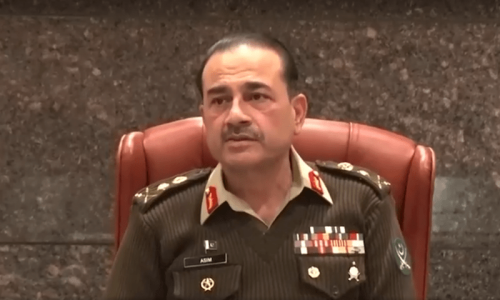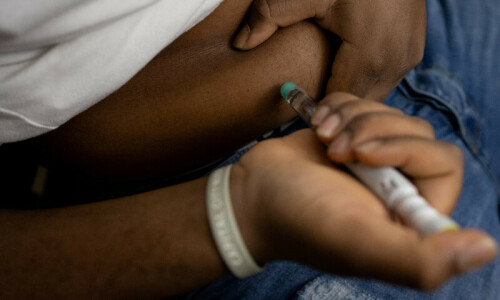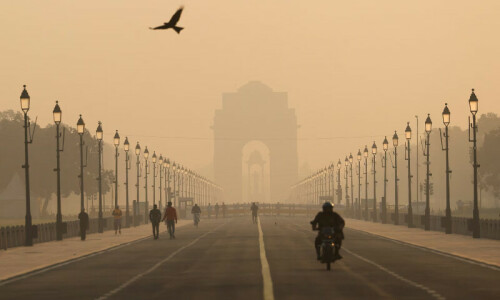SAY the word ‘crisis’ in Pakistan and most people will take it to mean the state of the economy with the country teetering on the brink of bankruptcy and default, and citizens struggling as inflation dramatically erodes the best of incomes.
Many others will add to that the political instability that has plagued the nation and is rooted in long decades of authoritarian rule when the Constitution and the law were treated with utmost contempt and more or less consigned to the rubbish bin.
Blatant authoritarian rule left no ambiguity about what it was. Ergo, you took sides knowing fully well what you stood for. This made the task of aligning with one side or the other easy. Yes, easy, but not necessarily painless, depending on the side you chose.
When the global environment dictated that the scope for the outright dictatorial ‘method of governance’ had shrunk and was too limited for its practitioners, innovative ways were devised to perpetuate the age-old practices cloaked in more acceptable facades.
Who isn’t experiencing or hasn’t experienced the fallout of the last political engineering exercise?
The politicians fought back. The two major national political parties, the PPP and the PML-N, signed the Charter of Democracy in 2006, ahead of the announcement of the 2007 elections (delayed till 2008 after Ms Benazir Bhutto’s assassination) and later joined hands to oust military ruler Gen Pervez Musharraf a little after he doffed his uniform.
But the system that replaced a Musharraf-supervised parliament, prime minister and cabinet, continued to face attacks by those who found it difficult to reconcile with their reduced overt rule, and we saw fabricated cases like ‘Memogate’, which even drew in civilian leaders such as Imran Khan and Nawaz Sharif, perhaps unwittingly, on the side of those orchestrating it to limit civilian space and powers.
Nonetheless, most civilian leaders agreed to the 18th Constitutional Amendment where the extraordinary powers, introduced by the usurper in accordance with the leeway given to him by the Supreme Court of Pakistan, were done away with.
This left the prime minister empowered as the leader of the House in the directly elected National Assembly and devolved powers and resources (via the National Finance Commission Award) to the federating units as envisaged in the 1973 Constitution.
Perhaps, the greatest tribute to a civilian leadership committed to a democratic transformation came when parliament completed its term (even if the elected prime minister did not when he was sent home on Supreme Court orders in an unprecedented ruling), fresh elections were held and power transferred from one civilian government to the next.
By 2016, it was clear that yet another government appeared on course to completing its term and fresh elections in 2018 would again see a peaceful transfer of power from one elected administration to another. The economy was doing well, despite the then finance minister’s obsession with an artificially maintained exchange rate, leading to a growing current account deficit.
Overall, the government appeared to be going well. This was a prospect that some powerful men in the establishment saw as unpalatable; they joined hands with like-minded friends in the judiciary to embark on another project of political engineering.
The recently retired army chief has acknowledged in a reported conversation with a journalist that ‘Dawn leaks’ was nothing more than a stick to beat the government and independent media with. Its destabilising effect, along with several other steps, can be judged easily as another elected prime minister was sent home on the most dubious of grounds.
You must be running out of patience and wondering why this columnist is taking you over such recent history that everybody knows well. I agree and will stop. But the point I was leading to necessitated these few paras be part of my submission.
Who isn’t experiencing or hasn’t experienced the fallout of the last political engineering exercise? Many are alarmed, and not without justification, at the deep divisions it has created in society — from state institutions to groups of family and friends, everyone is affected by it.
These divisions have manifested themselves in a seemingly bizarre interpretation of the Constitution, likened by experts to a rewriting of the document by the apex court, such as in a verdict on the disqualification of parliamentarians in defying the party whip. Not just this. Things have reached a point where an institutional leader seems content to be the leader of half his team while disregarding the existence of the remaining members.
On the other hand, when the army chief talks of supremacy of an elected parliament during an in-camera security briefing to the National Assembly, the members are reported to have lustily thumped their desks because a reiteration of the obvious by a powerful figure made them feel good about themselves.
What this state of play reflects is the biggest crisis we have faced in a long, long time. It is one of credibility. Yes, the credibility of institutions, their leaders and even of those who report on developments as observers or journalists, is in tatters. Literally.
You are either seen in this camp or that. It is because of this crisis of credibility that any dialogue appears an impossibility. The only exchange that seems possible and is happening freely today is that of the invective!
At the same time, the eternal optimist in me tells me that all is not lost just because the power elites are at loggerheads in an attempt to grab the biggest slice of the cake — regardless of the dignified, legitimate or worthy terms they couch their greed in — and the shirtless are getting nothing. Not even the crumbs.
And that is the majority of our population of over 200 million people. Over 65 per cent of that population is below the age of 30, many of them well below that figure. Some 20m of our children are out of school. Of those in school, I leave it to you to guess about the quality of education they receive.
Tomorrow has to belong to them. If it means a new social contract, so be it.
The writer is a former editor of Dawn.
Published in Dawn, April 16th, 2023















































Dear visitor, the comments section is undergoing an overhaul and will return soon.